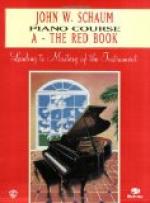“As you already know I do not believe in so-called ‘piano technic,’ which must be practised laboriously outside of pieces. I do not believe in spending a lot of time in such practise, for I feel it is time wasted and leads nowhere. I do not believe, for instance, in the struggle to play a perfectly even scale. A scale should never be ‘even,’ for it must be full of variety and life. A perfectly even scale is on a dead level; it has no life; it is machine-made. The only sense in which the word ‘even’ may be applied to a scale is for its rhythmic quality; but even in this sense a beautiful scale has slight variations, so that it is never absolutely regular, either in tone or rhythm.
“Then I do not believe in taking up a new composition and working at the technical side of it first. I study it in the first place from the musical side. I see what may be the meaning of the music, what ideas it seeks to convey, what was in the composer’s mind when he wrote it. In other words, I get a good general idea of the composition as a whole; when I have this I can begin to work out the details.
“In this connection I was interested in reading a statement made by Ruskin in his Modern Painters. The statement, which, I think, has never been refuted, is that while the great Italian painters, Raphael, Coreggio, and the rest have left many immature and imperfect pictures and studies in color, their drawings are mature and finished, showing that they made many experiments and studies in color before they thought of making the finished black and white drawing. It seems they put the art thought first before the technical detail. This is the way I feel and the way I work.
AVOID RESTRICTING RULES
“Because our ancestors were brought up to study the piano a certain way, and we—some of us—have been trained along the same rigid lines, does not mean there are no better, broader, less limited ways of reaching the goal we seek. We do not want to limit ourselves or our powers. We do not need to say: ’Now I have thought out the conception of this composition to my present satisfaction; I shall always play it the same way.’ How can we feel thus? It binds us at once with iron shackles. How can I play the piece twice exactly alike? I am a different man to-day from what I was yesterday, and shall be different to-morrow from what I am to-day. Each day is a new world, a new life. Don’t you see how impossible it is to give two performances of the piece which shall be identical in every particular? It is possible for a machine to make any number of repetitions which are alike, but a human, with active thought and emotion, has a broader outlook.
“The question as to whether the performer must have experienced every emotion he interprets is as old as antiquity. You remember in the Dialogues of Plato, Socrates was discussing with another sage the point as to whether an actor must have felt every emotion he portrayed in order to be a true artist. The discussion waxed warm on both sides. Socrates’ final argument was, If the true artist must have lived through every experience in order to portray it faithfully, then, if he had to act a death scene he would have to die first in order to picture it with adequate fidelity!”




